My First Brush with the Music Industry
This article also appears in Global Nerdy.
Clay Shirky: Gin, Television, and Social Surplus
If you’re a reader of the usual sites with links that nerds like, you’ve probably seen the video or read the writeup of Clay Shirky’s presentation at Web 2.0 on “Gin, Television, and Social Surplus”.
In his presentation, he describes a conversation with a TV producer, in which he talked about the effort that people put into the “Pluto” entry in Wikipedia. The producer, hearing this story, rolled her eyes and asked “Where do they find the time?”
Clay suggests that the producer believed that “free time”, which he refers to as “cognitive surplus” or “social surplus”, was TV’s by divine right. He posits that the mental energy once devoted to television watching and other equally passive ways of filling one’s spare time is being better spent — on the internet.
(I’ve always found that saying someone has “too much time on their hands” is an intellectually dishonest way of dismissing someone: see my entry Too Much Spare Time? and Cory Doctorow’s essay, Too Much Time on His Hands.)
If you haven’t seen the video of Clay’s presentation, here it is — it’s 16 minutes of your free time well spent:
The TV producer reminded me of a record executive whom I encountered at my first job out of school. It’s an interesting story about programming work and technology in the mid-90’s, the music industry and how predictions about technology can be way, way off.
My First Job Out of School

A screenshot from the 1991 version of the Mackerel Stack, a HyperCard stack the promoted Mackerel’s design work.
My first job fresh from getting my computer science degree at Crazy Go Nuts University was developing multimedia applications in Director at a little company called Mackerel Interactive Multimedia.
The year was 1995, when Myst still defined the cutting edge of multimedia, CD-ROMs and sound cards were still fairly novel peripherals and the only other opportunities for a wet-behind-the ears developer seemed to be at a bank or insurance company, neither of which seemed to be appealing. While the pay wasn’t great — I used to call us the “hos of technology” and did a Full Metal Jacket-esque routine that ended with me shouting “Me so geeky! Clicky-clicky! Me hack for long time!” — the place wasn’t soul-killing like a bank or insurance company might have been. I could wear whatever I wanted, I could dress up my office space however I pleased, the hours were flexible and the co-workers were great: a hip and cool set of young people, with a near 50:50 gender balance. It seemed like Douglas Coupland’s Microserfs, which had just been published at that time, right down to the ill-advised office romances (one of which was mine).
While the dream at the company was to write the next Myst, we paid the bills by writing multimedia apps for clients — typically interactive advertising or educational pieces that would eventually be distributed on CDs or even multiple floppies.
The company went under after a disastrous merger in 1997. Its story was covered by Cory Doctorow wrote an article for Wired about the Mackerel’s demise; unfortunately, it never got published in the magazine. The Mackerel story is told from a different angle by co-founders Dave Groff and Kevin Steele at the Smackerel site, which is subtitled A Biased History of Interactive Media.
Enter the Record Exec
One of the bands represented by the record exec’s company. You can try to guess who they are, and you should be able to figure out the record company as well.
One day during the summer of 1996, one of the founders came into the area where the developers hung out and told us that we’d landed a contract with an independent record label belonging to a major record company.
“Isn’t that a contradiction in terms?” I asked.
Apparently it wasn’t. The indy label turned out to be merely a new branch of the major record company. It would sign up-and-coming underground and alternative acts and use the major label for distribution. If the major label was pin-striped and buttoned-down, the indy label was its edgier nephew, clad in faux Hot Topic-esque cred. In spite of their trying-too-hard-to-be-cool aspects, we thought they’d make an interesting client.
The record company exec was a woman who was about five years past their twenty-something demographic. She gave off more of a business school vibe than a rock vibe. She peppered her speech with business-school-isms like “target audience” and “units sold”. She used the word “product” several times and didn’t use the word “music” or even “album” once. Everything she knew about music didn’t come from being a fan; it came from what she’d read in her market research reports.
“That’s why they don’t call it show art,” one of us quipped.
The Brainstorming Session
The CD player application from System 7, the version of Mac OS from 1996.
One of the goals of this initial meeting was to brainstorm some ideas for interactive apps that we could build for them. I had been working on an idea that I was rather proud of: CD player apps customized for specific albums. For any CD other than the one for it was customized, it would show a mostly plain interface, plus some promos for the album. However, if you used the player to play the album for which it was customized, it would “come alive” with lyrics, liner notes, album art and so on. It was an attempt to bring back what was lost in the move from LPs to CDs.
“Nice try, kid,” said the exec with great disdain. “We did some market research and we’ve determined that no one will ever listen to music on their computer. People see them as machines for getting work done. We’re aiming for the rec room, the den, the living room and the bedroom, not the home office. You computer guys are aiming for home office.”
“You sure about that?” our production manager asked. “We all use the CD players on our machines. For some of us, our computers are in our bedrooms and living rooms, and they’re also our primary stereos now.”
“That may be true for you,” she replied, “but you guys are the exception. Computers are great, but they’re office equipment. You don’t keep a typewriter or photocopier in your living room, so why would you have a computer there? And that’s where people listen to their music. Office equipment and entertainment: apples and oranges. Trust me – I’ve been in the music industry for a while – no one’s going to listen to music on their computer.”
I listened as a few other people had their ideas shot down in similar fashion. It was a matter of her knowing the music industry better than we did.
The Hail Mary MP3 Play
At some point during the increasingly futile brainstorming session, I remembered something that I’d brought back from the Macromedia User Conference. I reached into my laptop bag and fished out a floppy disc.
“Here, check this out,” I said, slotting the diskette into my laptop. “It’s something called Shockwave, which lets you embed multimedia applications inside web pages.”
“We don’t think there will be much interest in the world wide web outside of technical people. The pictures are tiny, you’re stuck with default fonts, and your customers have to go buy a modem. Too much tech hassle, too little payoff.”
“You should give this a look,” I insisted. “The company that makes the tool we use to write multimedia software is using MPEG layer 3 [the term “MP3″ hadn’t made common parlance yet] compression to squeeze music files into less space. There’s a small multimedia program on this floppy, and a whole three-minute song. It would normally take about 8 floppies to hold this song.”
I put the disk in my laptop and launched the Shockwave application, which started a tune playing.
“Sounds like crap,” she said. “And who’s the band? The Spin Doctors? They’re so over.”
“Ignore the band,” I said, trying to remain patient. “Just think of the possibilities. This three-minute single is only a megabyte in size. It fits on a floppy, which you can hand out, or you’d be able to download it in a reasonable amount of time. The download will be even faster on the new 56K modems.”
“Blah, blah, blah,” she said, making that opening-and-closing hand gesture signifying pointless chatter. “It only means something to you because you’re a techie. I’ve seen the market research, and I will tell you now: people are not going to be getting their entertainment from computers or the internet. It’s going to come from set-top boxes and MiniDisc recharging stations at their record stores.”
At this point, I decided that discretion was the better part of valour. “Well, you seem to have all the market research, so maybe the best thing would be for you to come up with ideas for an interactive application, and then we can hammer out the details with you in a later meeting.”
“I think that would be a good idea,” she said. She rose from her seat to leave the room, shaking her head.
“I don’t know about you,” I said to the others after confirming that she was out of earshot, “but I think the music industry needs to be destroyed.”
Recent Posts
Sunday picdump for December 22, 2024
It’s not just another Sunday, but the Sunday leading up to Christmas! It’s that time…
A reminder for April Fools’ Day
Have a good April Fools’ Day tomorrow, but be mindful about your pranking.
How NOT to sell a computer
As I’ve written before, I sometimes browse Facebook Marketplace for nothing more than pure entertainment,…
Sunday picdump for March 23, 2025
Another Sunday, another “picdump!” Here are 250 memes, pictures, and cartoons floating around the internet…
Sunday picdump for March 16, 2025
Another Sunday, another “picdump!” Here are 200+ memes, pictures, and cartoons floating around the internet…
Sunday picdump for March 9, 2025
Another Sunday, another “picdump!” Here are 200+ memes, pictures, and cartoons floating around the internet…


View Comments
"I don't know about you," I said to the others after confirming that she was out of earshot, "but I think the music industry needs to be destroyed."
Oh yes. As true today as it's ever been. But the damn thing won't die.
Hey Joey,
I've love this! Sad to say (agreeing with Julian), nothing has changed. The idiocy and close mindedness that I deal with on a regular basis still leaves me with wide eyed, slack jawed stunned look. I just can't get used to it now matter how many times I bump against it.
Back in TO for a few weeks soon. Maybe we can hit a street corner ;-)
Is 'hit a street corner' slang for paying for tail outside the old maple leaf gardens?
@chiamatt: Dude, David and I are musicans. Tail pays for us.
Okay, I've tried to guess who that band is, and it bothers me that I can't. Can I have a clue?
@Peter Lynn: Here's one hint: they're British.